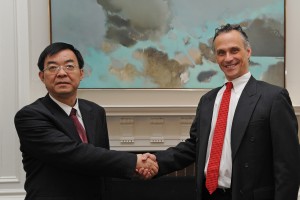Wesleyan, Chinese Social Science Group Enter Into Scholarly Partnership

This month, Wesleyan signed a memorandum of understanding with the Social Sciences in China Press (SSCP), the publishing arm of the Chinese Academy of Social Sciences (CASS), which formalizes an ongoing partnership between the two institutions. The agreement calls for a biennial scholarly forum involving representatives from Wesleyan and SSCP; mutual advertising to help each gain recognition in the other’s home country; exchange visitors; and cross-publishing of content between Wesleyan’s international journal History and Theory and SSCP’s Historical Research.
The Chinese Academy of Social Sciences is by far the most important center in China for studies in philosophy and the social sciences.
The relationship between Wesleyan and SSCP has been developing since 2010 when a delegation from SSCP first visited Wesleyan. President Michael Roth and the editors of History and Theory spent much of a day with the delegation discussing opportunities for scholarly interaction. As a result, the parties committed to hold two conferences—one in Beijing in 2011 focused around the topic of “Tradition,” and one at Wesleyan in 2013 to discuss “Comparative Enlightenments.” At the most recent conference, Gao Xiang, vice secretary of CASS and editor-in-chief of SSCP, spoke of the partnership with Wesleyan as “a golden example of what exchange should be between academic communities in the United States and China.”

This year, the two sides decided to formalize their cooperation with the memorandum of understanding. It was signed at a ceremony in the President’s office Dec. 10. Representing Wesleyan were President Michael Roth; Joyce Jacobsen, dean of the social sciences and director of global initiatives; Gary Shaw, associate editor of History and Theory; Peter Rutland, Colin and Nancy Campbell Professor in Global Issues and Democratic Thought; and Jennifer Tucker, associate professor of history.
“I’m delighted to forge an even stronger partnership with the Chinese Academy of Social Sciences and the Social Sciences in China Press,” said Roth. “The first two forums sparked dialogues that advanced the thinking of all who attended, and I look forward to many more productive discussions in the future.”
The parties will next convene at a forum in China in May 2015 on the theme of “Modernization.” Roth, Wesleyan faculty members, and other scholars from North America, Europe and China will attend.
Stephen Angle, chair of the College of East Asian Studies, has been integral in developing the relationship with the Chinese scholars.
“Our bi-annual, jointly-hosted forums have been sites of open, sophisticated dialogue across cultural and disciplinary borders,” he said. “They have also been opportunities for Wesleyan faculty and students to engage with leading Chinese scholars. It is exciting to have an agreement ensuring that these stimulating conversations will continue into the future.”
Ethan Kleinberg, executive editor of History and Theory, commented, “For History and Theory in particular, the partnership extends the reach of our journal into China through the scholar exchanges and also the publication of the Chinese translation of each H&T issue’s table of contents and article abstracts in SSCP’s journal. It is an opportunity for us to exchange ideas with leading Chinese scholars interested in the theory and philosophy of history through editor exchanges, joint conferences, and international workshops.”

